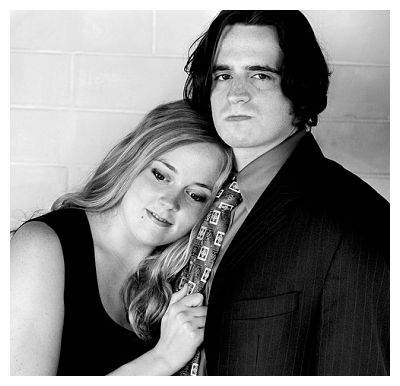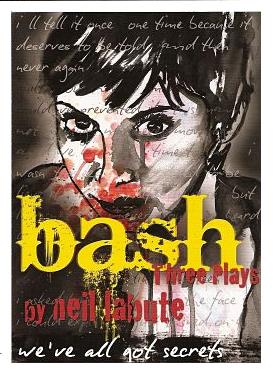Review: Bash - Three Plays by Vestige Group
by Michael Meigs
The Vestige Group is a small band of purists in an unpure world. They believe that theatre, up close and personal, has something to teach about the human condition. Something that you won't get from video or even from books.
They like extremes. Celebration, as in the goofily outrageous Gorilla Man or in Lonestar, A Popcorn Throwing Musical or examinations of the lost and desperate, as in Marisol, in Touchand in this grim trio of plays by Neil LaBute.
When presented off-Broadway in 2000, LaBute's Bash carried the title Bash, Latter-Day Plays, a transparent reference to the Mormon world of Utah and Brigham Young University, where he had studied and taught theatre for years. That was a cheap shot, I think, perhaps even a New York marketing ploy, for LaBute has drawn characters whose twisted lives could play out anywhere. He stresses his intent of universaility that with two of the titles: "Iphigenia in Orem" (Utah) and "Medea Redux." The middle piece, "A Gaggle of Saints," describes a high spirited overnight trip to New York, and none of the happenings have much to do with saints, sainthood or the Church of the Latter Day Saints (LDS).
He sets these events pretty solidly in the early 1980's, with passing references to flashbulbs, to the BeeGees and to daily viewing of Hogan's Heroes. That is, indeed, the period when he attended BYU as an undergraduate and accepted the Mormon faith. Bash put paid to that, however, for after the show played in New York, the LDS Church formally excluded him from fellowship, presumably because the play's portrait of dark, murderous individuals offended the elders of the church.
Vestige has brought theatre to popular, well-known venues such as Hot Mama's Coffee Shop and the US Art Authority, just north of the UT campus. This one is harder to find. Maybe not so much for the hard core theatre crowd, because 701 Tillery Street is the humble housing for the Greater Austin Creative Alliance (formerly the Austin Circle of Theatres) and for Austin Shakespeare. This East Austin building, probably a former school, is in a neighborhood wrapped by railroad tracks, ill marked, and not directly accessible from 7th street. You'll need to navigate there from Pleasant Valley Road, from Springdale, or by driving north from Cesar Chavez. Here's a Google map of 701 Tillery Street to help orient you. And when you get there, put your car in the lot on the north side of the building and enter from there (not through the door on Tillery Street).

Prepare for a close up experience with a dark world in a tiny black box theatre. The playing space is small and sparsely furnished. No more than 20 seats face the playing area. You could reach out and touch the actor.
These are monologues -- even the second one, with two characters side by side, speaking alternately but not hearing one another -- so it's difficult to distinguish between contributions of actor and director. Susie Gidseg directed Aaron Black in the first piece and Bastion Carboni directed the others. In each there's canny pacing of the action, intense concentration by the actor and building suspense.
I don't like Neil LaBute's texts. He focuses on the unthinking banality of evil in apparently ordinary people. But these monologues are vivid and wickedly structured. Each snaps shut like a bear trap.
Aaron Black as the unnamed young man in "Iphigenia in Orem" is an ordinary working guy, employed in an office of some sort -- maybe one of those high tech or service firms that flourish in Utah, with its well-educated, earnest workforce. He is nervous, affable in a strained sort of way, and we understand that he is speaking to us as if we were a single anonymous individual he met in a hotel while traveling on business. He has a long story that he wants to tell about the sudden death of his infant daughter.
 Helyn Rain Messenger and Hunter Smith recount different but congruent stories of their trip to New York City with a group of other young people for a weekend overnight of partying, exploring the big city, and trying out new things. Their stories reveal an immense gap between them, between men and women, and between civilized society and primitive, hormone-driven impulsiveness. LaBute's sardonic approach is to present them side by side as they recount the weekend of the big bash (an ambiguous, dangerous term), to different audiences of unseen friends.
Helyn Rain Messenger and Hunter Smith recount different but congruent stories of their trip to New York City with a group of other young people for a weekend overnight of partying, exploring the big city, and trying out new things. Their stories reveal an immense gap between them, between men and women, and between civilized society and primitive, hormone-driven impulsiveness. LaBute's sardonic approach is to present them side by side as they recount the weekend of the big bash (an ambiguous, dangerous term), to different audiences of unseen friends.

The pay-off of the evening is Jen Brown in "Medea Redux." Greek legends of Medea are many, but the reference is probably to Euripides' play. (You could look it up.) Here LaBute's premise is less artificial. The young woman has been brought in for questioning and there's a tape recorder on the table. She tells her story, starting many years ago when she was a fourteen-year-old, selected for special attentions by her teacher. Brown delivers clearly, compulsively, suggesting the burden of love, resentment and abandonment that she has gone over again and again in her mind, every night of her life, with no one to hear it. Childish delight, dependence, manipulation, disappointment, and a transformation of her innocence into unwanted, lonely adulthood.

This is transcendent acting. The young woman is simple, perhaps even a bit simple minded, but she has a clear understanding of the offense and a clear, long meditated plan for revenge. Brown smokes incessantly throughout, and the swirling visible fumes symbolize the evil that has poisoned her existence. They turn and rise, vanishing into the ducts overhead. Brown and director Carboni have established an incantatory rhythm. As the story proceeds, our sympathy with the victim, stroked with each successive revelation, is turned into mounting alarm. We begin to understand that something catastrophic is approaching.
Vestige takes you by the throat with the gentle, tight grip of a psychotic. It's a memorable evening. You won't like these characters. But by God, you will remember them.
[Note for those alarmed by secondary smoke: the production uses herbal cigarettes, not tobacco.]
Review by webmaster, TheatreAustin, Yahoo groups, May 28
Review by Lois at AustinPost.com, May 12
EXTRAS
NowPlayingAustin interviews directors Susie Gidseg and Bastion Carboni, May 14 (7 min., 50 sec.)
Click to view program for Bash, three plays by Neil LaBute by Vestige Group
Bash - Three Plays
by Neil LaBute
Vestige Group
